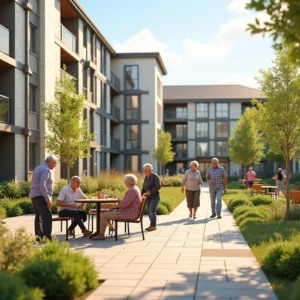As we grow older, our priorities begin to shift. Where once we may have been driven by career goals, ambition, or raising a family, later life offers a unique opportunity to focus on what truly matters: connection, purpose, and belonging.
But what does it mean to belong? And why is community such a powerful force in shaping a fulfilling life, especially in our later years?
Contents
Rediscovering Purpose Through Connection
One of the greatest human needs is to feel valued and seen. In later life, when careers slow down and families grow more independent, many older adults struggle with feelings of isolation or a loss of identity. This is where community steps in—not just as a support system, but as a source of renewed purpose.
Belonging to a group, sharing experiences, and contributing to something bigger than oneself fosters a deep sense of meaning. Whether it’s participating in a local gardening club, volunteering, or simply sharing stories over a cup of tea, these moments of connection can have profound emotional and mental health benefits.
The Health Benefits of Staying Social
Research consistently shows that staying socially active is key to healthy aging. Those who engage regularly with others experience lower rates of depression, improved memory, and even longer lifespans. Community involvement helps reduce stress, keeps the mind sharp, and promotes a sense of stability and well-being.
In contrast, isolation in older adults has been linked to higher risks of cognitive decline and various health complications. Building and maintaining relationships isn’t just emotionally fulfilling; it’s essential for a healthy, balanced life.
Creating Community That Feels Like Home
A supportive, caring environment can make all the difference. That’s why thoughtfully designed living spaces, such as this care home in St Albans in the UK, are so impactful. These communities are built not only to provide high-quality care, but also to foster real relationships, daily engagement, and a strong sense of belonging among residents.
Imagine waking up in a place where you’re known by name, surrounded by friendly faces, with access to activities that make you feel alive and involved. That kind of environment transforms the experience of aging into a time of joy, discovery, and connection.
Practical Ways to Foster Belonging
If you or a loved one are navigating later life, here are some practical steps to create a greater sense of community and belonging:
- Get involved locally: Join a class, club, or group that aligns with your interests.
- Volunteer: Giving back creates purpose and introduces you to like-minded people.
- Stay connected: Regular calls or visits with family and friends go a long way.
- Seek supportive environments: Consider living spaces that prioritize community and connection.
Final Thoughts
Belonging isn’t a luxury; it’s a necessity. In our later years, it becomes even more important to feel part of something, to share life’s moments, and to know that we matter. Whether it’s through community programs, purposeful living, or supportive residential settings, there are countless ways to rediscover connection.
Because no one should grow older feeling alone. Everyone deserves to belong.




